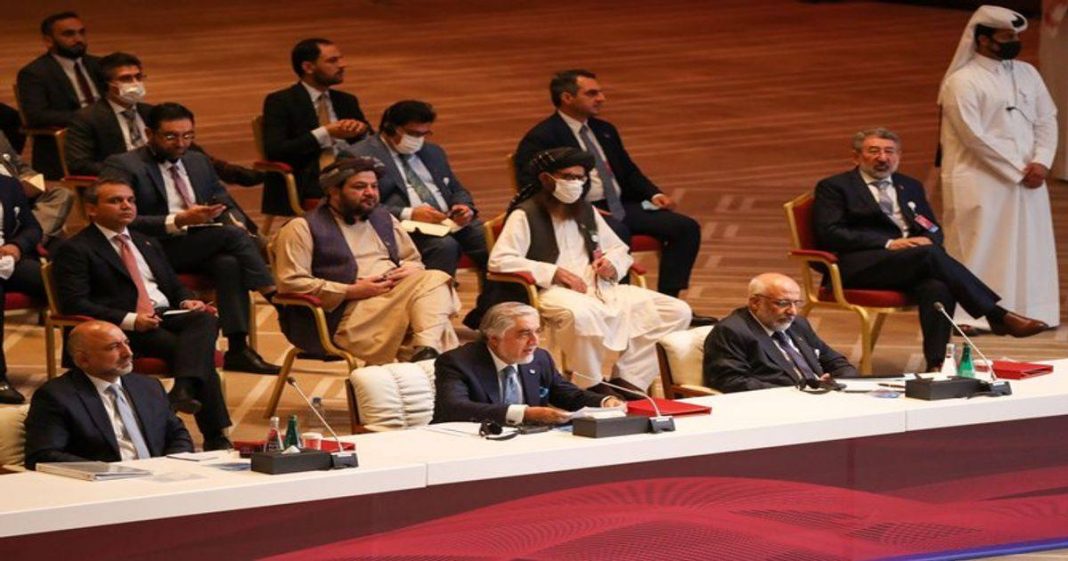The talks between the Taliban and Afghan government have been formally launched in Doha on September 12. Ending the 40-year-long conflict is a dream of the Afghans that would hopefully be realised in the current rounds of talks.
The stumbling blocks are many. Those with some understanding of the positions the two sides take on issues would know it’s not going to be smooth sailing. As contentious issues are debated, rhetoric would take second place and negotiators would be expected to outline their views on specific issues to create a convergence to deliver an outcome.
Both sides will have to confront complex issues including those below.
One of the forceful weapons in the government’s armour would be to demand a ceasefire for the duration of the talks. This would — on face — make sense because cessation of hostilities would help create an ambience for constructive dialogue. Taliban are not prepared to accept this as ending attacks on government positions would not go well with its volunteers. Once hostilities cease and Taliban fighters return to their villages and resume normal life, it will be difficult to motivate them to take up arms again if talks fail.
Read more: Afghan peace process: Abdullah Abdullah to visit Pakistan on invitation of PM Imran
The government would try to prolong the negotiating process while trying to create rifts in the Taliban ranks. There is no guarantee that talks would actually deliver an agreement. Ceasefire would remain a crucial point. There would be a possibility of ceasefire at a later stage if both sides break the ice on other issues.
The government side that also includes other factions would offer to induct Taliban representatives in various tiers of government — a ploy to induce the group into participation. Taliban would not accept this under any circumstances. They would demand restoration of their government as it existed prior to the US occupation. This would be unacceptable to the government side.
Under US pressure and impending threat of ending financial assistance, Ghani’s government may consider an interim government option. However, there would be considerable opposition to the idea from many including the President, who would not wish to be robbed of their positions of power.
Read more: Pakistan says India wants to spoil Afghan peace process
The government side would support the ‘status quo’ as: there is an elected Parliament; a constitution and an elected government in place. How could any arrangement subvert this system that reflects the ‘aspirations of the people’? Taliban would argue their government in 2001 was undone by foreign occupation and they don’t recognise the legitimacy of any system created under foreign military occupation. They would also assert they control over half the country where they are operating administrative and judicial systems.
What role should US play to remove deadlocks?
Here, the US will have to play a vital role. A consensus could emerge, on a transitional government comprising Taliban as the dominant group and other factions. The environment for such a government would be created if Taliban announce general amnesty and assure all citizens, minorities and women of their rights. The general amnesty would apply to all opponents except those guilty of war crimes.
Read more: Afghan government presses truce demand in Taliban talks
Taliban would also demand the removal of their names from all blacklists including the UN’s. This could be resolved if the US assures support for this.
The danger is that the talks may drag on. There are many spoilers wanting to derail the peace process and prolong the status quo. Such forces could launch unprovoked attacks. The attack on the Vice-President’s convoy was one such incident. Militant outfits like IS, Turkistan Islamic Movement, Fidai Mahaz and others must be watched closely. There are also warlords who may try to subvert the process.
Announcement of general amnesty could help reduce uncertainty that prevails in case of return of Taliban as a major partner.
Breakdown of talks would spread anarchy. There would inevitably be more desertions from the army. The economy would worsen and joblessness would increase. If financial aid were to halt, government systems could collapse. Then it will be easy for Taliban to advance on Kabul and take control. The risks are high. Reconciliation depends on whether those in government think of their own positions or of the country’s stability, even at their personal expense.
Rustam Shah Mohmand is a specialist of Afghanistan and Central Asian Affairs. He has served as Pakistan’s ambassador to Afghanistan and also held position of Chief Commissioner Refugees for a decade. The article originally appeared at The Express Tribune and has been republished with the author’s permission. The views expressed in this article are the author’s own and do not necessarily reflect the editorial policy of Global Village Space.














